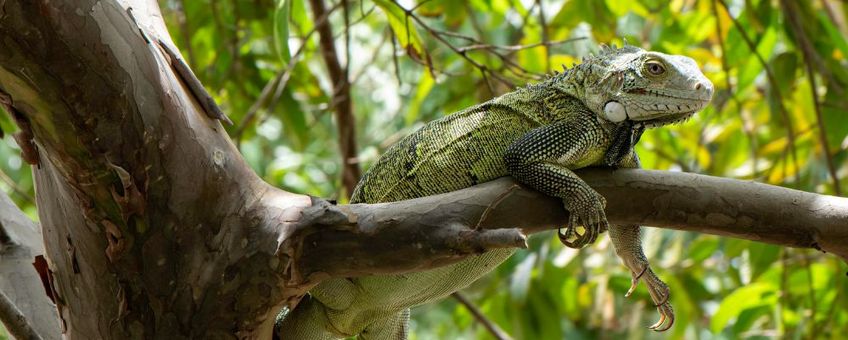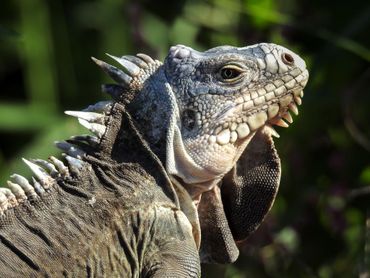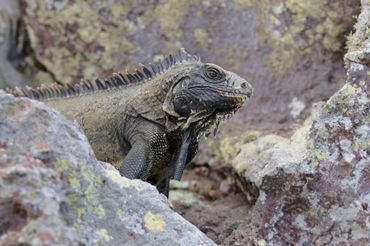
Island Iguanas: tales of survival and conservation in the Caribbean
Dutch Caribbean Nature Alliance (DCNA)Continued surveillance is essential to avert further dissemination and hybridization of the non-native green iguana with the indigenous iguana species.
Native iguanas
 Saba and St. Eustatius each have their own unique native iguana populations. On Saba, the Saba Green iguana, despite its name, becomes darker in color compared to non-native iguanas, with black or dark brown skin and occasional lighter markings on its throat and belly. On St. Eustatius, the critically endangered Lesser Antillean iguana is distinguishable by the lack of the large scale on the corner of their jaw and the absence of black stripes on its tail that the non-native green iguanas are known for.
Saba and St. Eustatius each have their own unique native iguana populations. On Saba, the Saba Green iguana, despite its name, becomes darker in color compared to non-native iguanas, with black or dark brown skin and occasional lighter markings on its throat and belly. On St. Eustatius, the critically endangered Lesser Antillean iguana is distinguishable by the lack of the large scale on the corner of their jaw and the absence of black stripes on its tail that the non-native green iguanas are known for.
Native iguanas are critical to local ecosystems, for example as important seed dispersers. However, like many species from the islands, these iguanas are vulnerable to habitat loss and competition from introduced species like the green iguana. Green iguanas can compete with native iguanas for resources, and interbreeding between the species can lead to hybridization through which the native populations is slowly displaced.
The green iguana

The introduction of the green iguanas to St. Eustatius is believed to have occurred through the pet trade. They are popular pets due to their striking appearance and docile nature. Unfortunately, many pet owners are not prepared for the long-term commitment and release them into the wild. Additionally, green iguanas find their way to the SSS-islands as hitchhikers on container ships that travel between the islands.
Once introduced, green iguanas can quickly establish themselves in new environments. With females laying up to 70 eggs per year, they can breed prolifically, outnumbering the native iguanas who lay fewer eggs. As a consequence, the green iguana population can grow rapidly, leading to hybridization and competition with native species for resource and habitat.
Management strategies
On Saba and St. Eustatius, local conservation organizations and government agencies have implemented control measures to reduce the numbers of non-native green iguana populations. These include trapping and euthanasia programs, and public education campaigns to discourage pet ownership and release.
While these efforts have been successful in reducing the green iguana population on Saba and St. Eustatius, ongoing vigilance is needed to identify remaining non-native animals and to prevent more iguanas arriving from St. Maarten. Strict biosecurity measures between the islands are essential, especially at the harbors on St. Maarten to prevent non-native iguanas from being transferred to Saba and St. Eustatius. Invasive species pose a significant threat to the unique biodiversity of island ecosystems, and their management requires sustained cooperation and commitment from all stakeholders.
DCNA
The Dutch Caribbean Nature Alliance (DCNA) supports science communication and outreach in the Dutch Caribbean region by making nature-related scientific information more widely available through amongst others the Dutch Caribbean Biodiversity Database, DCNA’s news platform BioNews and the press. This article contains the results from several scientific studies but the studies themselves are not DCNA studies. No rights can be derived from the content. DCNA is not liable for the content and the in(direct) impacts resulting from publishing this article.
Text: DCNA
Photos: Hans Smulders (lead picture: green iguana); Christian König; Philippa King
